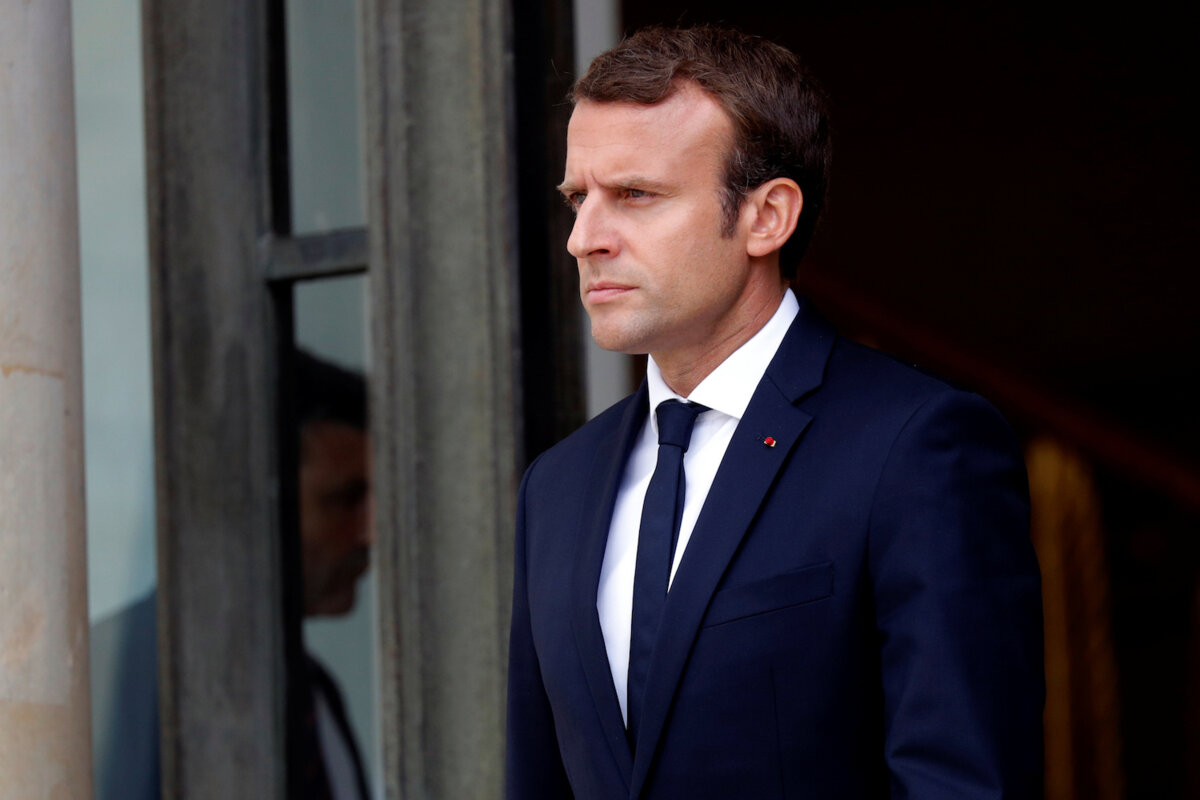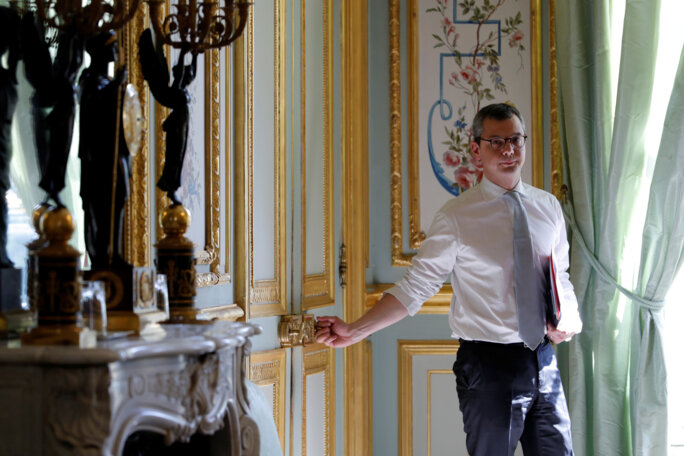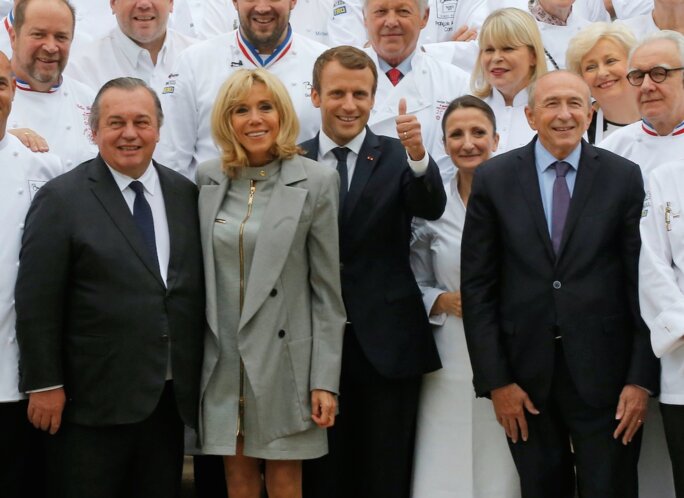On the face of it, the two affairs do not have a great deal in common. One involves the current secretary general at the Élysée – the president's chief of staff – Alexis Kohler and the conflict between his public role and private interests. The second concerns the major discounts that Emmanuel Macron's successful election campaign received from service providers. Yet the two affairs, both revealed by Mediapart, share a common script and also highlight the same failing.
The common theme is the influence that private interests – in this case large companies – have on public life. Meanwhile the moral issue they demonstrate is the persistent weakness of the country's institutional counter-checks and balances; in one case the ethics in public life commission the Commission de Déontologie de la Fonction Publique, and in the other the election campaign accounts watchdog the Commission Nationale des Comptes de Campagnes et des Financements Politiques (CNCCFP). It is an old, familiar French story, one now given new life by the arrival of 'Macronism' in power.

Enlargement : Illustration 1

Whichever way you look at it, the Kohler and 'discount' affairs highlight the seamless links – and the risks that arise as a result – that exist between the peaks of two pyramids of power under the Macron presidency. One of these pyramids consists of the world of politics and the upper echelons of the civil service; the other, the world of business and the private sector. By linking them, the peaks of these two pyramids are liable to produce an overall system whose victims will be, depending on the circumstances, citizens, voters, consumers or even the very idea that we have the right to seek a fair society. In other words, one without privileges.
Let us recap. The first case, revealed by Mediapart, involves Alexis Kohler, the president's chief of staff. On the various occasions he has worked in the public sector Kohler has been in a position to put the state's resources at the service of the Mediterranean Shipping Company, a major Italian-Swiss shipping line with which he has family ties. To whom did he owe his loyalty; his own family or the state?
Martine Orange's investigation for Mediapart has also shown that, having worked in different positions in the Ministry of the Economy and Finances, which dealt with several cases involving the MSC, Alexis Kohler then went on to work for the very same company. This practice is known by the cosy term of 'pantouflage', a system of revolving doors in which a senior official walks out of the civil service and straight into a well-paid job in the private sector. Indeed in the spring of 2017, before the election, the man who is now running the Elysée for President Macron found himself sitting back at the finance ministry – but this time on the shipping line's side of the table.
This particular blurring of roles disconcerted some in the corridors of power. They include the former junior industry minister Christophe Sirugue under President François who has publicly expressed his surprise at fact that Kohler was at the meeting in March 2017.
There have always been conflicts of interest and the Kohler affair is not the first of its kind. One does not need to go back to the 1388 decree by French king Charles VI who, aware of the risks involved, forbade his governors to enter contracts with those they governed, to find them. The current era has more than its fair share of such conflicts.
One example under President Nicolas Sarkozy is that of Éric Woerth, who was both budget minister and treasurer of the ruling conservative UMP party at the same time, a duplication of functions whose shortcomings were exposed in the Bettencourt affair. More recently, under President Hollande, there was the case of presidential advisor Aquilino Morelle. It was discovered that in the past he had discreetly worked for a pharmaceutical firm at the same time as being a member of the prestigious Inspection Générale des Affaires Sociales (IGAS) inspectorate, whose role is to police that very sector.
However, the Macron administration extols the union between public and private as a benefit for everyone probably more than any previous presidency, in the name of two symbols of that “new world” the president is so fond of: efficiency and modernity. In fact, one has lost count of the number of people from the private sector or 'pantouflards' who are in the government and ministerial offices.
So it is no coincidence that some ministers, such as the current health minister Agnès Buzyn, do not even detect any conflict of interest. “The pharmaceutical industry does its job, and I've never followed the herd when it comes to this industry,” the former doctor and academic said back in 2013 during a meeting organised by a firm of lobbyists. “It needs to be pointed out how wanting experts who have no links with the pharmaceutical industry raises the question of the competence of those experts.”
We are entitled to ask if we are not witnessing the gradual blurring of the lines between private and public and seeing the emergence of a new poorly-controlled hybrid, 'pubvate' or 'priblic' sector. Of some kind of merger-acquisition of the two, of the sort that Emmanuel Macron specialised in while he was at the Rothschild merchant bank in France between 2008 and 2012, before becoming François Hollande's advisor at the Élysée.
From vigilance to complacency
France has never been particularly ahead of the game when it comes to the issue of virtue in public life. It was not until article 2 of a new law in October 11th, 2013, that there was a legal definition of a conflict of interests, covering “any situation of overlap between a public interest and public or private interests … that might influence or appear to influence the independent, impartial and objective exercise of a function”. This can be summed up in the words of the French political writer Benjamin Constant who wrote of “the appearance of collusion and complicity”.
A conflict of interest is not about a specific action but a situation. It may involve a situation that is not necessarily illegal in itself: in criminal law it is covered by the offences of “illegal conflict of interest” and “influence peddling”. But there is absolutely no need for the judicial system to get involved in order for a conflict of interest to be worthy of reporting. Quite the contrary. For it is precisely in that grey area of the state, between the lawful and unlawful, where the danger lurks. The Kohler affair is exactly that kind of case.

Enlargement : Illustration 2

As the public prosecutor in Palermo, Roberto Scarpinato, wrote in his 2008 book Il Ritorno del Principe ('The Return of the Prince') “visible power runs the risk of becoming the illegitimate child of invisible power, itself spawned by a myriad of marriages of secret interests or underground deals”. The political acceptance of conflicts of interest, the way that 'Macronism' today seems to tolerate it, is the cultural foundation on which the abuse of power and a soft, distant, invisible corruption can prosper.
In the affair involving election campaign discounts, the facts are of a different nature. As Antton Rouget's revelations on Mediapart over the last month have shown - disclosures which have been followed up by Le Monde and Le Canard enchaîné - Emmanuel Macron benefited from significant discounts from several service providers in his presidential campaign. These were for campaign services such as the hiring of halls, video production, the loan of equipment and so on.
Particularly intriguing is the involvement of two private sector groups in the affair. The first is the leading events company GL Global, run by Olivier Ginon who is a close ally of the interior minister and former mayor of Lyon Gérard Collomb and now in favour at the Élysée. The second is the set design and video firm Eurydice whose director of strategy, Arnaud Jolens, negotiated the company's discounted rates that helped Macron, while at the same time working in a personal capacity on Macron's En Marche! election campaign. After Macron's victory in May 2017, Jolens became the director of the 'image and events' unit at the Élysée.

Enlargement : Illustration 3

Since the publication of numerous press articles on the discount affair, a veritable online armada of supporters of the president's En Marche! movement, some of them anonymous, has noisily sought to defuse the affair. They have declared that not only was the provision of these discounts not illegal in itself, they were applied to others too; and that in any case, if Emmanuel Macron is a good negotiator that is all to his credit.
But these comments, which have flooded the social networks in recent weeks, are false in many respects. For one thing, under the law any discounts that are too large and which are not normal practice can be considered to be hidden aid to a candidate by companies, who have been banned from financing public life in France for several decades. And it is precisely for these reasons that some candidates and even businesses refuse discounts in the name of fairness in that most important of electoral contests, the presidential election.
However, the must disturbing aspect of this affair is without doubt the tacit support given to the Macron campaign team by the election finances commission the CNCCFP which has approved its accounts and which, having refused to back down on this, last week published an incorrect statement.
It is worth recalling that it was this commission, created under 1990 legislation, that failed to spot the 20 million euros of false billing in Nicolas Sarkozy's 2012 campaign accounts; this was to later become what is called the Bygmalion affair. Lacking resources, with a small budget and inadequate staffing levels, and also lacking the apparent desire to demand extra from a government which is happy not to give it any more, the CNCCFP has demonstrated its impotence for almost thirty years. It has limited investigative powers, meaning that in reality its inspection function is an illusion.
It is worth pointing out that the reason the election discount affair could be exposed in the press was because Mediapart had fought a legal battle with the CNCCFP, taking it to the country's highest administrative body the Conseil d'État. It found in Mediapart's favour, giving a right to access documents from its investigations into election campaigns. The Commission had refused such transparency.
So another thing that the campaign discount and Kohler affairs have in common is that they both highlight yet again the failure of France's watchdogs. Rather than raising the alarm over the details in these cases, the institutions simply waved them through. That is true not just of the CNCCFP but of the public life ethics commission the Commission de Déontologie de la Fonction Publique too, which saw no problem in Alexis Kohler's situation.
It was this same ethics body which, under President Sarkozy, allowed the deputy secretary general of the Élysée at the time, François Pérol, to become chief executive officer of the new Banque Populaire-Caisse d’Épargne (BPCE) group, whose merger he had just overseen while working for the French presidency. It also waved through the appointment of Stéphane Richard, who had been chief of staff to economy minister Christine Lagarde, as chief executive of the telecommunications giant Orange.
In a scathing work called 'La République des Camarades' ('The Republic of Comrades'), journalist Robert de Jouvenal gave a foretaste of Emmanuel Macron's 'new world' when he wrote: “Democracy, which was based on monitoring, fell asleep through complacency.” Those words were written more than a century ago in 1914.
-----------------------------------------------------------------------------
- The French version of this report can be found here.
English version by Michael Streeter


